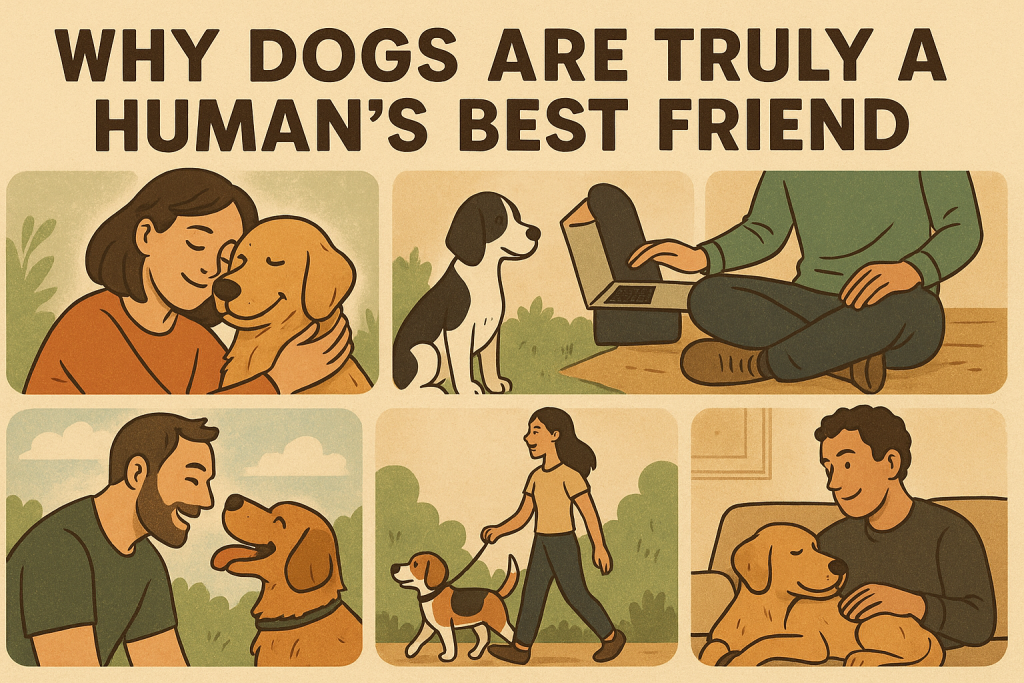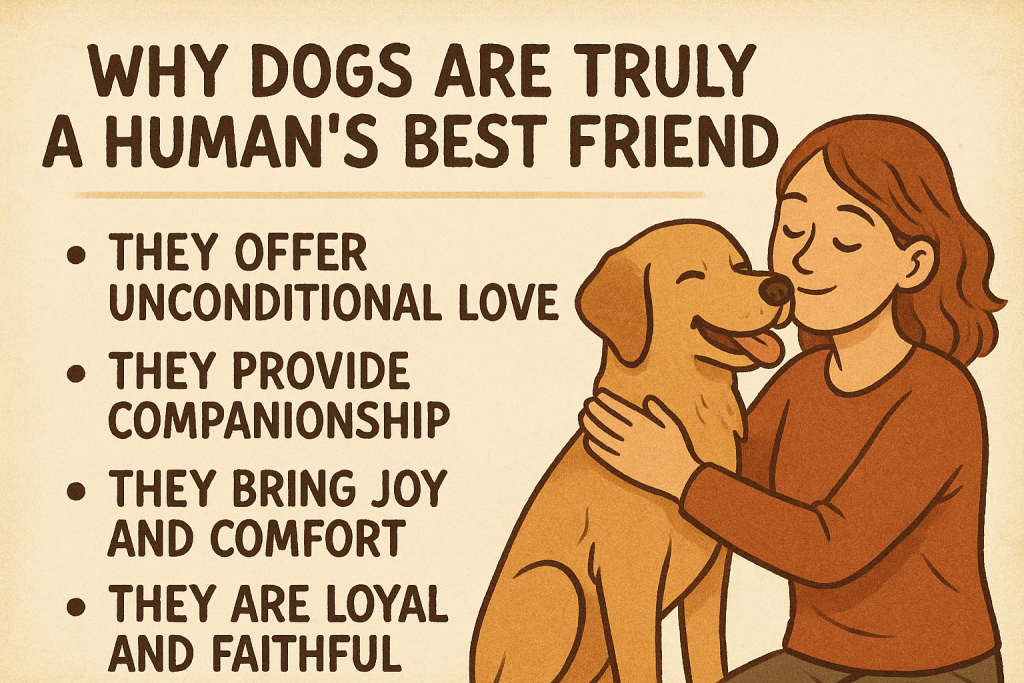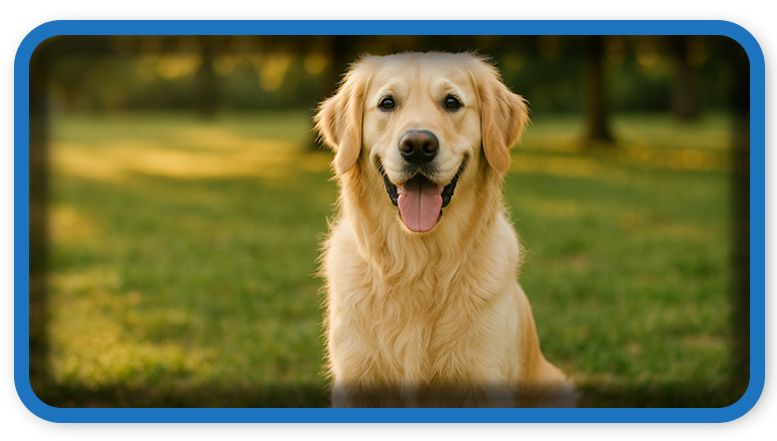⏲️ Estimated reading time: 8 min
Why Dogs Are Truly a Human’s Best Friend. Dogs have been loyal companions to humans for thousands of years. From offering protection to providing emotional support, they are more than pets they’re family. Discover why dogs truly deserve the title of man’s best friend.
Dogs Is a Human’s Best Friend
Throughout history, dogs have earned their place as loyal and loving companions to humans. Whether serving as protectors, helpers, or emotional supporters, their unwavering devotion makes them unique among all domesticated animals. The phrase “man’s best friend” isn’t just a catchy saying it’s a truth backed by thousands of years of companionship, service, and unconditional love.
In this in-depth article, we explore why dogs are so deeply connected to human beings, covering their evolution, roles in society, emotional intelligence, and therapeutic value.
A History of Loyalty: How Dogs Became Our Companions
Dogs are descendants of wolves and were domesticated between 20,000 and 40,000 years ago. Archaeological evidence suggests that early humans began forming bonds with wolves who showed less fear and more curiosity around campsites. These wolves were gradually domesticated through selective breeding for traits such as friendliness, cooperation, and trainability.
Over millennia, dogs evolved alongside humans. They were used in hunting, herding, guarding, and even warfare. But beyond utility, dogs became treasured companions. Tombs and cave paintings across the world reveal just how revered dogs were in ancient societies from Egypt to Mesopotamia to China.
Emotional Support and Unconditional Love
One of the most powerful reasons dogs are considered our best friends is their ability to provide emotional support. Unlike many animals, dogs can read human emotions with remarkable accuracy. They respond to tone of voice, facial expressions, and body language, often providing comfort during times of stress or sadness.
Studies have shown that petting a dog can lower blood pressure, reduce cortisol (the stress hormone), and trigger the release of oxytocin the “love hormone.” For people dealing with anxiety, depression, or PTSD, a dog’s presence can be incredibly therapeutic.
Dogs in Service: Beyond Companionship
Dogs are not just affectionate they’re intelligent and willing to serve. This has led to their widespread use in service roles:
- Guide Dogs: Helping the visually impaired navigate the world safely.
- Therapy Dogs: Providing comfort in hospitals, nursing homes, and schools.
- Search and Rescue Dogs: Tracking missing persons during natural disasters or accidents.
- Military and Police Dogs: Detecting explosives, drugs, and assisting in apprehension.
- Medical Alert Dogs: Detecting seizures, blood sugar changes, or allergens.
These roles highlight not only their loyalty but also their capacity to learn complex tasks and their willingness to serve humans selflessly.
The Science Behind the Bond
The bond between dogs and humans goes beyond emotions science backs it up. In a study published in Science magazine, researchers discovered that when dogs and humans gaze into each other’s eyes, both experience a spike in oxytocin levels. This mutual exchange mirrors the bonding behavior observed between mothers and their infants.
Additionally, dogs have evolved to understand human cues better than even chimpanzees. They follow pointing gestures, understand human gaze, and even pick up on our intentions. This deep cognitive empathy strengthens the relationship between dog and human.
Dogs and Children: A Special Connection
For many families, a dog is a child’s first friend. Growing up with a dog teaches children valuable lessons in empathy, responsibility, and unconditional love. Dogs can sense vulnerability and often act more gentle and protective around children.
Moreover, exposure to dogs at a young age has been shown to reduce the risk of allergies and asthma. It also encourages outdoor activity and social interaction, contributing to a healthier, more active lifestyle.
Rescue and Shelter Dogs: Loyalty Despite Hardship
Perhaps one of the most touching aspects of dogs is their ability to love and trust again, even after abuse or neglect. Rescue dogs often form incredibly strong bonds with their adopters. Their gratitude is visible and deeply moving.
Adopting a dog from a shelter not only saves a life but also brings a grateful and loyal companion into your home. These dogs often show even more affection, knowing they’ve been given a second chance.
Dogs and the older adults: Companionship in Later Years
For older adults, dogs offer companionship, routine, and a sense of purpose. Many older adults suffer from loneliness or social isolation, and a dog’s presence can bring joy and vitality into their lives.
Walking a dog encourages physical activity and can reduce the risk of cardiovascular disease. Additionally, dogs can serve as social facilitators encouraging conversations and connections with neighbors and other dog owners.
Dog Breeds: One for Every Personality
From tiny Chihuahuas to giant Great Danes, there’s a dog breed for every type of person. Energetic breeds like Border Collies suit active individuals, while calmer breeds like the Cavalier King Charles Spaniel make ideal companions for quieter households.
Mixed breeds and mutts also make incredible pets often possessing a mix of desirable traits. Choosing the right dog for your lifestyle enhances the bond and ensures a harmonious relationship.
Dogs and Mental Health: Therapy Beyond Words
Dogs are increasingly used in mental health settings. Canine-assisted therapy helps individuals with:
- PTSD
- Anxiety disorders
- Autism
- Depression
- Loneliness
In therapy settings, dogs help patients feel safe and understood without the fear of judgment. Their silent presence can be more powerful than words, offering emotional healing and resilience.
The Joy of Play: A Shared Language
One of the most joyful aspects of living with a dog is playtime. Whether it’s a game of fetch, tug-of-war, or simply running in the yard, dogs encourage spontaneity and laughter. They remind us to live in the moment and celebrate small joys.
This shared enjoyment creates a deep bond, reinforcing trust and affection on both sides.

Dogs in Popular Culture
From Lassie to Scooby-Doo, dogs have dominated popular culture as symbols of loyalty and courage. Films, literature, and art often portray dogs as heroes and devoted companions.
Real-life stories of dogs traveling thousands of miles to reunite with owners or saving lives from fire or flood further cement their legendary status.
Grieving a Dog: A Loss Like No Other
Losing a dog is deeply painful because of the depth of the emotional bond. Grieving pet owners often describe the loss as equivalent to losing a family member or close friend. This isn’t surprising, considering the emotional and physiological connection we develop with our dogs over years of daily life.
Pet bereavement support groups and even dog memorial services are becoming more common, reflecting the profound impact dogs have on our lives.
Here’s a list of traits and values dogs offer beyond just loyalty, showing why they’re more than just devoted companions:
🐾 Things Dogs Give Us Beyond Loyalty
- Unconditional Love
Dogs love without judgment, regardless of our mood, appearance, or status. - Emotional Support
They sense sadness or anxiety and offer comforting presence without needing to understand the problem. - Protection
Many breeds will instinctively guard their family from harm even risking their own safety. - Joy and Laughter
Their goofy antics, playful energy, and happy tail wags bring daily happiness. - Companionship
Dogs reduce feelings of loneliness by simply being there your constant friend. - Routine and Structure
Caring for a dog brings healthy habits like regular walks, feeding times, and active play. - Empathy
Dogs are incredibly intuitive and can often “read” human emotions better than some people. - Healing Presence
Therapy dogs help patients with PTSD, trauma, or chronic illness by just being near them. - Physical Activity Motivation
Dogs push us to walk, run, or play improving our health and fitness. - Social Connection
Walking a dog invites interaction and conversation, helping people make new friends. - Teaching Responsibility
For children and adults alike, dogs teach consistency, patience, and care. - Comic Relief
Their spontaneous behavior and expressions often lighten tense situations. - Scent Detection Skills
They can detect drugs, explosives, cancer, seizures, or allergens saving lives. - Heroic Acts
Many stories exist of dogs pulling children from pools, alerting families to fires, or guiding lost hikers to safety. - Forgiveness
Even after neglect or hardship, dogs can forgive and love again when treated kindly.

A Friendship Without Conditions
Dogs ask for little food, affection, and companionship but they give us everything. They love without conditions, forgive easily, and show joy in the simplest things. They teach us how to live in the present, love deeply, and find happiness in everyday moments.
In a world that often feels fast-paced and isolating, dogs remain a symbol of love, loyalty, and companionship that never wavers. They are truly a gift to humanity.
📩 Do you have questions or suggestions? Leave a comment or contact us!
🏷️ Tags: dogs, man’s best friend, emotional support animals, therapy dogs, dog adoption, loyal pets, dog breeds, pet parenting, service animals, animal companions
📢 Hashtags: #Dogs #BestFriend #DogLovers #TherapyDogs #PetLove #RescueDogs #AnimalCompanions #CanineLove #DogLife #ServiceDogs
Only logged-in users can submit reports.
Discover more from HelpZone
Subscribe to get the latest posts sent to your email.

